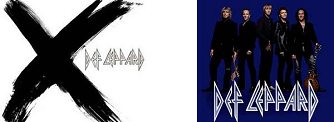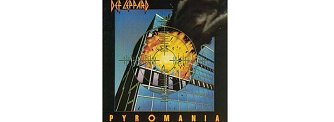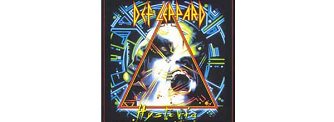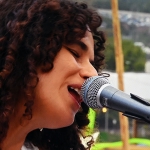Def Leppard Interview
Featuring Joe Elliott and Phil Collen

The new album mixes the classic Leppard sound with a contemporary feel using lots of new technology seamlessly and interestingly. Can you describe this meeting of the classic Leppard style and contemporary edge?
(Phil) There’s always a bit of a reaction against the last album you’ve done. And with the last album EUPHORIA, we made a conscious effort to make it sound like Leppard, like classic Def Leppard from HIGH & DRY to ADRENALISE. So with this recored it was very natural; we didn’t have the stipulation and rigid kind of things that we had on other albums. Like on SLANG we tried not to sound like Def Leppard; we avoided the big backing vocals and stuff. With this one we didn’t worry about it so much and we didn’t make the boundaries. We used the backing vocals where we thought necessary, we used the harmonies - we weren’t ashamed of putting anything in there. We weren’t ashamed of doing real drums on some tracks and programmed drums on others, and using technology to our advantage.
(Joe) We just approached this record with a totally open mind. We were writing songs just for the hell of writing them; we weren’t restricted and we didn’t think about writing a song a certain type of way because it didn’t fit the format. There was no format to fit; we were making it up as we went along. Everybody sees us as a rock band but we’ve always listened to more than just rock. We’ve brought those elements into the music. It’s a little more obvious on this one because we were a bit more radical when we did it.
(Phil) The great thing about this album is that it’s slightly more diverse for us. We have three different producers on it. Pete Woodroffe did the eight tracks; Per and Andreas in Sweden did one track; and Marti Frederiksen did the three - Beautiful, Now and Everyday.

Tell me about the track ‘Now’ and what it was like working with acclaimed producer Marti Frederiksen.
(Joe) The track Now is one of the three songs we did with Marti Frederiksen, who you may know worked with Jagger, Aerowsmith and Ozzy.
(Phil) Marti Frederiksen - he was great. He is very enthusiastic; he’s like an eight-year old boy. He’s full-on all the time. He’s a super-talented musician. He does the whole thing - sings, plays guitar and drums, everything. So with him it was great because it was totally inspiring and that song wouldn’t have turned out that way if it would have been with someone else. Plus, he co-wrote it with us.
(Joe) I see Now as one of those great examples of the meeting of the traditional thing and the contemporary sound that we are introducing on this record. It’s got the elements of like the real drums, it’s got (I wouldn’t say big backing vocals) powerful dbs on the chorus and I get the opportunity, vocally, to express it much more in a singing voice than in a screachy voice, which is something I enjoy a lot more to be quite honest.
Tell me about ‘Unbelieveable’. Is it a romantic song?
(Joe) Unbelieveable is a song we did in Sweden with Andreas Carlsson and Per Aldeheim. Unbelievable is a romantic song, I suppose, it you want to use that analogy. It comes under the heading of ‘the rock ballad’ I suppose. But we did approach it in a different way; we tried to make it sound less syrrupy than your average rock ballad. I mean lyrically, I think it’s got moments that are really kind of blatant; when you’ve got a line like ‘Got your name all tattooed on my heart‘, sometimes that can be a little too shocking for people. For other people, it really brings a lump out in their throat…
And ‘You’re So Beautiful’?
(Joe) It’s strange how peoples’ instant take on a song can be so different even we’re kinda’ both on the same lines. Whenever I hear Beautiful I always think of it as being a cross between Billy Idol and Eddie And The Hot Rods, even though it sounds nothing like it. It’s just in that feel of just the simplicity of the drums and bass, and the little guitar over the top and the voice, just there not cluttered up by anything. It just gives room for the lyrics and the melody to come through.
(Phil) Again, this is Marti Frederiksen. We had most of the song and he said ‘wouldn’t it be great - you guys used to do this thing where you had a bridge section, a chorus, and then it would go somewhere else.’ We never even realised that and he pointed it out and he said ‘so I think it should have a tag on it.’ So we had this kinda beat-less thing that goes (Phil singing) “cos you’re so beautiful, yeah.” And it went to another level, he actually pushed it.

Describe to us the extensive production of the beautiful ballad ‘Long Long Way To Go’. Do you see it as a potential single?
(Joe) I think Long Long Way To Go is a single. Whether it’s first, second or third, I just think it’s that strong that it should be a single. For me, it’s probably the most challenging vocal I’ve done since we did Love Bites. Even though it’s not in a higher register, it was such an emotive performance that had to given on that because of the lyric. On that song I think must have attempted it a dozen times, I just kept going back to it and re-addressing it and changing bits and listening to it, and thinking ‘this could be better, that could be better.’ It was worth the effort you know. Occasionally, you have a song where you really get the opportunity to just ‘drive a nail home fully’. That’s why we have the whole string arrangement on it, and we’ve got David Camel to do strings, and we went the whole hog. We’ve got strings to Spanish guitar to drum loops to regular drums to huge vocals to the very bone-dry, in-ya-face lead vocal thing - we really went to town on it.
(Phil) We really wanted to tug at the old heart strings. It was like, ‘okay, what does it need?’ And it was Spanish guitar. It was emotive and so we said okay. It was we’ll have them weeping in the aisles. It was one of them things. You hear the vocal and it’s in context with it. And a Spanish guitar actually does that - we’ve never used a nylon guitar in anything before. We’ve had the strummy thing but again it was what the song was crying out for.
Describe for us the minimalist feel in ‘Torn To Shreds’ and how it contrasts to some of the other ballads on the album.
(Phil) Torn To Shreds, again produced by Pete Woodroffe. In sharp contrast to Long Long Way To Go is minimalist in its approach on the chorus for example. I think we would have ruined it if we’d have gone ‘alright, we’re gonna stick the Def Leppard backing vocals to it’. So we didn’t. We complemented Joe’s vocal and I also think it sounds very contemporary; it’s a bit drier, it’s not kinda flooded in echo and reverb and stuff like that. It kind of hits home. Again, it’s a bit of a creeper and a lot of people have said ‘Ooh, I like this one.’ We were unaware that it would potentially be a single.
**page*

Do you think you’ve moved into a new area of vocal production?
(Joe) The vocals on the new album are probably the most radical we’ve done since we first worked with Mutt. Mutt used to mix the vocals in so I wasn’t out front the way that Paul Rogers would be in Free or Robert Plant in Zeppelin. We had a lot more going off in the background and it was almost like we were a unified kind of front thing. In this respect a lot of the songs have been written in a similar way but not as bombastic so there was much more room for expression; I didn’t have to scream over the top of massive drums. Sometimes, especially on a song like Torn To Shreds, the drums are actually quite laid back in the verse where you’re actually listening to the parts more than the sound of them. So it gives you a bit more room to just kinda relax and not have to get the fog horn out and scream over the top, because it was the only way you were going to be heard. But yeah, this whole record has been challenging in that respect. It’s not been challenging as in ‘oh my God, it’s so high I’m going to have to get the pincers out to reach these notes.’ It’s more a case of going for the quality and expression and being able to emote the lyrics. So people when they hear them, (as Phil was saying, it tuggs at the haartstrings) they actually listen to what you’re singing and are moved, rather than concentrating on how you’re singing it. I think that was much more important on this record than anything we’ve done in our recent past.

How did ‘Four Letter Word’ come about?
(Joe) Whenever I listen to to the vocal on Four Letter Word I keep relating it back to Lennon’s Twist and Shout. When you listen to that and you can feel for him because you can see in your mind, you can see the veins on his temples throbbing because he’s really going for it so much, and his voice is on the verge of cracking. But that’s the excitement of it, it’s like ‘is he going to get through this before he falls over?’ That’s exactly the kind of danger that we were trying to get across in that vocal; it was just in the register, right on the cusp of my range. And you had to be totally on your metal to get it right.
(Phil) The song originally was supposed to be like an Elvis country song and it was really low. Then, all of a sudden, it took on a life of its own and before we knew it, it sounded like it was straight off HIGH AND DRY. And it was like ‘Joe, you’ll have to sing it an octave up,’ and that’s why it was so high and the highest one on the album.
(Joe) Certainly it was the most gritty, for sure.
(Phil) And it had a real energy and the way he sung Now was like whoah, yeah!
‘Cry’ is quite a dark song. Can you tell us abit about it?
(Joe) Cry, when we first started working on it, it always had this potential to be great and it actually ended up being kind of left off the record right until the end. We were sat in the kitchen saying ‘it’s a real shame that (whatever it was called at the time) didn’t work out. How about we give it another go?’
(Phil) We’d done a demo round at my house in California and we wrote some lyrics and thought ‘well, not quite right’. It went through through a few different changes but the backing kind of remained the same. Like a year later, we got to Dublin and Ronan McKew who was assistant engineer programmed this new drum thing and all of a sudden it was ‘ah, okay‘ and it got this edge and excitement that it hadn’t had in the previous incarnations.

(Joe) It had a lot of very intricate and really exciting guitar parts on it that were just craving out for something to allow it to breathe. And all the melodies and lyrics we’d come up with were bland, they really were! They just weren’t working. Then we basically came up with this idea of just making it extremely dark. So, when you’re writing a lyric you just get in a character and you’re doing it from the third person. So if I’m writing a song about addictions, it’s not about mine. We once did a song called From The Inside when we did it from the drug’s point of view which was the most bizarre thing to do. But this was like Sympathy For The Devil and when Jagger sings ‘allow me to introduce myself‘ you know exactly that he’s talking about the man downstairs. There had to be irony in this lyric because it is about someone struggling with their addiction (no matter what it is) and we kept it pretty open-minded so it could be anything from coffee to heroin. The opening line is like, ‘Here comes the flood, can you feel the love?’ It had to be done ironically so the performance had to be ironic which was why when you listen to the vocal there’s affects going off, not to make it sound like the devil, but to make it sound threatening, and make the listener pay attention. And to approach a song like this with a subject as serious, so anybody that’s been in that situation can relate to it. We’ve been there, we’ve seen it; we’ve been in this industry long enough now to have friends, relatives and aquaintances come and go through certain addictions. So we actually have the experience to actually do this first-hand and get it right.
**page*

‘Everyday’ is a great pop-rock track. Where did you get your positive influences from?
Joe) I love Everyday, I really do - it’s probably my second or third favourite song on the record. I mean, they’re all my babies, it’s hard to pick a favourite but it always gets me excited because it reminds me of Cheap Trick, it reminds me of the great pop-rock records I listened to as a kid. They were timeless to me and still are. It’s such a bubbly song, and such a great ‘let’s have a good time!’ It’s got all the melodies and the harmonies, and the guitars. There’s even a Sitar bit on it, so we were definately going the whole Beatle-esque, Cheap Trick route. It’s like there’s George Harrison there and some of the vocal melodies are very familiar without being direct theft. We’ve always worn our influences on our sleeves and never been afraid to admit them. But it’s a pop song, it’s a great commercial song and it’s instant; that’s the great thing about it. It’s one of those songs in that when you hear it and as soon as it’s finished, I, personally, want to put it on again.
‘Gravity’ seems like a step in a new direction, maybe influenced by some new rockers?
(Phil) Gravity actually sounds pretty different to everything else on there. It’s the shortest song we’ve ever done I think at 2 minutes 30 or 40 seconds. And we crammed everything into it! It’s got a rappy kind of chorus but it’s still got the melody in there. It’s a bunch of different influences, from INXS to No Doubt to Linkin Park. I mean it’s all in there but it sounds like us and is very exciting. And again, it went through a million changes and was originally called Perfect Girl, and it was a totally different song. But we kept the backing track and just threw everything else out and just re-wrote this thing over the top and it was very sparce; it’s got this really low-end kind of sub-woofer bass thing. It’s super-low and again something we have never done before. So it was really interesting and exciting and it’s really pushing the envelope a little bit, for us. It’s pushing the boundaries a little bit further.
How does Def Leppard go about writing and recording a great track, for instance ‘Let Me Be The One’?
(Joe) Let Me Be The One started off as a demo - with piano on it and all sorts of stuff and that song went through so many changes. We stripped it down - sat in my front room with four acoustic guitars, took sections out and put new ones in, and kept the verse the way it was. We’ve been calling it recently ‘the runt of the litter’ - it was so nearly not there! Like we were going to abandon this whole thing. And even when we’d finished recording it we were still a bit unsure; it was like ‘almost’ great and the missing ingredient was the orchestra. And as soon as that went on, it just gelled everything together. Suddenly, it became a contender, it really did.

(Phil) There were a few stages, before we actually put the strings on it, we’d done it with an electric guitar and thought ‘well, okay’. We’d heard it in a different context and we also had this little countrified tag on it after the chorus which only really made sense after we put the electrics on - all of a sudden it started to shine. And then it was a different song once it was done electric. Joe redid the vocal and then we put the strings on two weeks ago in L.A. and it just went bang! Like, Whoa! And it was the song we always wanted to hear.
Tell me about ‘Girl Like You’.
(Phil) It’s kind of an uptempo rock-pop song. This song was one of Vivian’s and it was very poppy and we obviously made it a bit more ‘Leppified‘. But again, it sounds different; it’s got a nice commerciality to it and it’s refreshing.
(Joe) It also has a chorus that you have to listen to on headphones to actually justify a lot of things on there because it sounds like a very complicated chorus. There are so many counter-backing vocals in this chorus and it really is over-the-top but in a really good way, and is very, very exciting.
On the track ‘Scar’ we seem to get old school Def Leppard and a bit of an epic. Do you agree?
(Joe) It’s probably the most obvious throw-back to old Lep on the album. It’s got every element of what people know Leppard for album track-wise. It’s got all the guitars, big chorus, it’s got me up in the high register where it needs to be, big long solo, break-down sections, and it’s probably the longest track on the album as well. It’s got the atmospheric introduction, an atmospheric fade-out, it’s got everything. It’s like a mini-opera.
(Phil) It’s also got some other guitar influences not just pure Leppard stuff. It’s got like the Hendrix-Doors era type stuff. The way it even starts off is just this backwards guitar and sounds like something you’d hear from a soundtrack. It’s Leppard plus if you like. It was a lot of fun and the last track we did, and a kind of antidote to the rest of the stuff really. It was like, ‘what’s missing?’ And it was the final piece to the jigsaw really. I thinbk I MP3-ed the demo from my house to you in California to Dublin and we really whipped it together pretty quick.

Do you believe that Steve may have been an influence on this record?
(Phil) Joe said to me, “God, it’s been 11 years since Steve died.” And all day I was thinking about it, and then I, literally, come up with all the parts within four minutes; all the different guitar sections; which was very weird, I’ve got to say. So it was totally influenced by Steve, without him even being there. That’s what I was thinking about all that day. We spoke on the phone, I was in California and Joe was in Dublin, and it was actually very bizarre. I was sitting there and all these sections were coming out and I sent over the demo and we just went from there really. It was spooky.
I’ve noticed that the writing on this album seems to be a team effort…
(Joe) Every song on this album has got one mother and four mid-wives -that’s the way that I look at it all because we’ve all done everything to each other’s songs, which is why all the songs written on this album are credited to everyone in the band. We’ve all been there from the inception of the song right to the end, and if one second gets changed then it’s valid. And that’s the great thing about being in a band; it’s a team, it’s co-operative.

|
|

|

The All-American Rejects |
LATEST GALLERY IMAGES

Crime Scenes 
Good Neighbours |
|
|

